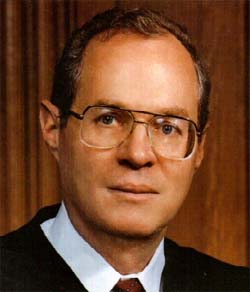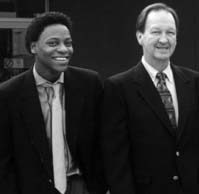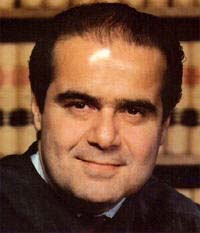
|
Excerpts From the Decision: By Justice Kennedy
The complaints described their crime as deviate sexual intercourse, namely anal sex, with a member of the same sex (man). . . The petitioners exercised their right to a trial de novo in Harris County Criminal Court. They challenged the statute as a violation of the Equal Protection Clause of the Fourteenth Amendment and of a like provision of the Texas Constitution. Those contentions were rejected. The petitioners, having entered a plea of nolo contendere, were each fined $200 and assessed court costs of $141.25. The Court of Appeals for the Texas Fourteenth District considered the petitioners' federal constitutional arguments under both the Equal Protection and Due Process Clauses of the Fourteenth Amendment. After hearing the case en banc the court, in a divided opinion, rejected the constitutional arguments and affirmed the convictions. The majority opinion indicates that the Court of Appeals considered our decision in Bowers v. Hardwick to be controlling on the federal due process aspect of the case. Bowers then being authoritative, this was proper. We granted certiorari to consider three questions: 1. Whether petitioners' criminal convictions under the Texas Homosexual Conduct law which criminalizes sexual intimacy by same-sex couples, but not identical behavior by different-sex couples violate the Fourteenth Amendment guarantee of equal protection of laws? 2. Whether petitioners' criminal convictions for adult consensual sexual intimacy in the home violate their vital interests in liberty and privacy protected by the Due Process Clause of the Fourteenth Amendment? 3. Whether Bowers v. Hardwick should be overruled? The petitioners were adults at the time of the alleged offense. Their conduct was in private and consensual.
In Griswold the Court invalidated a state law prohibiting the use of drugs or devices of contraception and counseling or aiding and abetting the use of contraceptives. The Court described the protected interest as a right to privacy and placed emphasis on the marriage relation and the protected space of the marital bedroom. After Griswold it was established that the right to make certain decisions regarding sexual conduct extends beyond the marital relationship. In Eisenstadt v. Baird, the Court invalidated a law prohibiting the distribution of contraceptives to unmarried persons. The case was decided under the Equal Protection Clause, but with respect to unmarried persons, the Court went on to state the fundamental proposition that the law impaired the exercise of their personal rights. . . The opinions in Griswold and Eisenstadt were part of the background for the decision in Roe v. Wade. As is well known, the case involved a challenge to the Texas law prohibiting abortions, but the laws of other states were affected as well. Although the Court held the woman's rights were not absolute, her right to elect an abortion did have real and substantial protection as an exercise of her liberty under the Due Process Clause. The Court cited cases that protect spatial freedom and cases that go well beyond it. Roe recognized the right of a woman to make certain fundamental decisions affecting her destiny and confirmed once more that the protection of liberty under the Due Process Clause has a substantive dimension of fundamental significance in defining the rights of the person. . . . The facts in Bowers had some similarities to the instant case. A police officer, whose right to enter seems not to have been in question, observed Hardwick, in his own bedroom, engaging in intimate sexual conduct with another adult male. The conduct was in violation of a Georgia statute making it a criminal offense to engage in sodomy. One difference between the two cases is that the Georgia statute prohibited the conduct whether or not the participants were of the same sex, while the Texas statute, as we have seen, applies only to participants of the same sex. Hardwick was not prosecuted, but he brought an action in federal court to declare the state statute invalid. He alleged he was a practicing homosexual and that the criminal prohibition violated rights guaranteed to him by the Constitution. The Court, in an opinion by Justice White, sustained the Georgia law. Chief Justice Burger and Justice Powell joined the opinion of the Court and filed separate, concurring opinions. Four Justices dissented. The Court began its substantive discussion in Bowers as follows: "The issue presented is whether the federal Constitution confers a fundamental right upon homosexuals to engage in sodomy and hence invalidates the laws of the many states that still make such conduct illegal and have done so for a very long time." That statement, we now conclude, discloses the Court's own failure to appreciate the extent of the liberty at stake. To say that the issue in Bowers was simply the right to engage in certain sexual conduct demeans the claim the individual put forward, just as it would demean a married couple were it to be said marriage is simply about the right to have sexual intercourse. The laws involved in Bowers and here are, to be sure, statutes that purport to do no more than prohibit a particular sexual act. Their penalties and purposes, though, have more far-reaching consequences, touching upon the most private human conduct, sexual behavior, and in the most private of places, the home. The statutes do seek to control a personal relationship that, whether or not entitled to formal recognition in the law, is within the liberty of persons to choose without being punished as criminals.
Having misapprehended the claim of liberty there presented to it, and thus stating the claim to be whether there is a fundamental right to engage in consensual sodomy, the Bowers Court said: "Proscriptions against that conduct have ancient roots." In academic writings, and in many of the scholarly amicus briefs filed to assist the Court in this case, there are fundamental criticisms of the historical premises relied upon by the majority and concurring opinions in Bowers . We need not enter this debate in the attempt to reach a definitive historical judgment, but the following considerations counsel against adopting the definitive conclusions upon which Bowers placed such reliance. At the outset it should be noted that there is no longstanding history in this country of laws directed at homosexual conduct as a distinct matter. Beginning in colonial times there were prohibitions of sodomy derived from the English criminal laws passed in the first instance by the Reformation Parliament of 1533. The English prohibition was understood to include relations between men and women as well as relations between men and men. . . . The historical grounds relied upon in Bowers are more complex than the majority opinion and the concurring opinion by Chief Justice Burger indicate. Their historical premises are not without doubt and, at the very least, are overstated. It must be acknowledged, of course, that the Court in Bowers was making the broader point that for centuries there have been powerful voices to condemn homosexual conduct as immoral. The condemnation has been shaped by religious beliefs, conceptions of right and acceptable behavior, and respect for the traditional family. For many persons these are not trivial concerns but profound and deep convictions accepted as ethical and moral principles to which they aspire and which thus determine the course of their lives. These considerations do not answer the question before us, however. The issue is whether the majority may use the power of the state to enforce these views on the whole society through operation of the criminal law. "Our obligation is to define the liberty of all, not to mandate our own moral code." Chief Justice Burger joined the opinion for the Court in Bowers and further explained his views as follows: "Decisions of individuals relating to homosexual conduct have been subject to state intervention throughout the history of Western civilization. Condemnation of those practices is firmly rooted in Judeao-Christian moral and ethical standards." As with Justice White's assumptions about history, scholarship casts some doubt on the sweeping nature of the statement by Chief Justice Burger as it pertains to private homosexual conduct between consenting adults. In all events we think that our laws and traditions in the past half century are of most relevance here. These references show an emerging awareness that liberty gives substantial protection to adult persons in deciding how to conduct their private lives in matters pertaining to sex. "[H]istory and tradition are the starting point but not in all cases the ending point of the substantive due process inquiry." This emerging recognition should have been apparent when Bowers was decided. In 1955 the American Law Institute promulgated the Model Penal Code and made clear that it did not recommend or provide for criminal penalties for consensual sexual relations conducted in private. It justified its decision on three grounds: (1) The prohibitions undermined respect for the law by penalizing conduct many people engaged in; (2) the statutes regulated private conduct not harmful to others; and (3) the laws were arbitrarily enforced and thus invited the danger of blackmail. In 1961 Illinois changed its laws to conform to the Model Penal Code. Other states soon followed. In Bowers the Court referred to the fact that before 1961 all 50 states had outlawed sodomy, and that at the time of the Court's decision 24 states and the District of Columbia had sodomy laws. Justice Powell pointed out that these prohibitions often were being ignored, however. Georgia, for instance, had not sought to enforce its law for decades. The sweeping references by Chief Justice Burger to the history of Western civilization and to Judeo-Christian moral and ethical standards did not take account of other authorities pointing in an opposite direction. A committee advising the British Parliament recommended in 1957 repeal of laws punishing homosexual conduct. Parliament enacted the substance of those recommendations 10 years later. . . . In our own constitutional system the deficiencies in Bowers became even more apparent in the years following its announcement. The 25 states with laws prohibiting the relevant conduct referenced in the Bowers decision are reduced now to 13, of which 4 enforce their laws only against homosexual conduct. In those states where sodomy is still proscribed, whether for same-sex or heterosexual conduct, there is a pattern of nonenforcement with respect to consenting adults acting in private. The State of Texas admitted in 1994 that as of that date it had not prosecuted anyone under those circumstances. Two principal cases decided after Bowers cast its holding into even more doubt. In Planned Parenthood of Southeastern Pa. v. Casey, the Court reaffirmed the substantive force of the liberty protected by the Due Process Clause. The Casey decision again confirmed that our laws and tradition afford constitutional protection to personal decisions relating to marriage, procreation, contraception, family relationships, child rearing, and education. In explaining the respect the Constitution demands for the autonomy of the person in making these choices, we stated as follows:
The second post-Bowers case of principal relevance is Romer v. Evans. There the Court struck down class-based legislation directed at homosexuals as a violation of the Equal Protection Clause. Romer invalidated an amendment to Colorado's constitution which named as a solitary class persons who were homosexuals, lesbians, or bisexual either by "orientation, conduct, practices or relationships," and deprived them of protection under state antidiscrimination laws. We concluded that the provision was born of animosity toward the class of persons affected and further that it had no rational relation to a legitimate governmental purpose. As an alternative argument in this case, counsel for the petitioners and some amici contend that Romer provides the basis for declaring the Texas statute invalid under the Equal Protection Clause. That is a tenable argument, but we conclude the instant case requires us to address whether Bowers itself has continuing validity. Were we to hold the statute invalid under the Equal Protection Clause some might question whether a prohibition would be valid if drawn differently, say, to prohibit the conduct both between same-sex and different-sex participants. Equality of treatment and the due process right to demand respect for conduct protected by the substantive guarantee of liberty are linked in important respects, and a decision on the latter point advances both interests. If protected conduct is made criminal and the law which does so remains unexamined for its substantive validity, its stigma might remain even if it were not enforceable as drawn for equal protection reasons. When homosexual conduct is made criminal by the law of the state, that declaration in and of itself is an invitation to subject homosexual persons to discrimination both in the public and in the private spheres. The central holding of Bowers has been brought in question by this case, and it should be addressed. Its continuance as precedent demeans the lives of homosexual persons. The stigma this criminal statute imposes, moreover, is not trivial. The offense, to be sure, is but a class C misdemeanor, a minor offense in the Texas legal system. Still, it remains a criminal offense with all that imports for the dignity of the persons charged. The petitioners will bear on their record the history of their criminal convictions. Just this term we rejected various challenges to state laws requiring the registration of sex offenders. We are advised that if Texas convicted an adult for private, consensual homosexual conduct under the statute here in question the convicted person would come within the registration laws of a least four states were he or she to be subject to their jurisdiction. This underscores the consequential nature of the punishment and the state-sponsored condemnation attendant to the criminal prohibition. Furthermore, the Texas criminal conviction carries with it the other collateral consequences always following a conviction, such as notations on job application forms, to mention but one example. . . . The rationale of Bowers does not withstand careful analysis. In his dissenting opinion in Bowers Justice Stevens came to these conclusions: "Our prior cases make two propositions abundantly clear. First, the fact that the governing majority in a state has traditionally viewed a particular practice as immoral is not a sufficient reason for upholding a law prohibiting the practice; neither history nor tradition could save a law prohibiting miscegenation from constitutional attack. Second, individual decisions by married persons, concerning the intimacies of their physical relationship, even when not intended to produce offspring, are a form of liberty protected by the Due Process Clause of the Fourteenth Amendment. Moreover, this protection extends to intimate choices by unmarried as well as married persons." Justice Stevens' analysis, in our view, should have been controlling in Bowers and should control here. Bowers was not correct when it was decided, and it is not correct today. It ought not to remain binding precedent. Bowers v. Hardwick should be and now is overruled.
Had those who drew and ratified the Due Process Clauses of the Fifth Amendment or the Fourteenth Amendment known the components of liberty in its manifold possibilities, they might have been more specific. They did not presume to have this insight. They knew times can blind us to certain truths and later generations can see that laws once thought necessary and proper in fact serve only to oppress. As the Constitution endures, persons in every generation can invoke its principles in their own search for greater freedom. From the Concurrence By Justice O'Connor
The Texas statute makes homosexuals unequal in the eyes of the law by making particular conduct - and only that conduct - subject to criminal sanction. It appears that prosecutions under Texas' sodomy law are rare. This case shows, however, that prosecutions under 21.06 do occur. And while the penalty imposed on petitioners in this case was relatively minor, the consequences of conviction are not . . . In Bowers , we held that a state law criminalizing sodomy as applied to homosexual couples did not violate substantive due process. We rejected the argument that no rational basis existed to justify the law, pointing to the government's interest in promoting morality. The only question in front of the Court in Bowers was whether the substantive component of the Due Process Clause protected a right to engage in homosexual sodomy. Bowers did not hold that moral disapproval of a group is a rational basis under the Equal Protection Clause to criminalize homosexual sodomy when heterosexual sodomy is not punished. This case raises a different issue than Bowers : whether, under the Equal Protection Clause, moral disapproval is a legitimate state interest to justify by itself a statute that bans homosexual sodomy, but not heterosexual sodomy. It is not. Moral disapproval of this group, like a bare desire to harm the group, is an interest that is insufficient to satisfy rational basis review under the Equal Protection Clause. Indeed, we have never held that moral disapproval, without any other asserted state interest, is a sufficient rationale under the Equal Protection Clause to justify a law that discriminates among groups of persons. . . That this law as applied to private, consensual conduct is unconstitutional under the Equal Protection Clause does not mean that other laws distinguishing between heterosexuals and homosexuals would similarly fail under rational basis review. Texas cannot assert any legitimate state interest here, such as national security or preserving the traditional institution of marriage. Unlike the moral disapproval of same-sex relations - the asserted state interest in this case - other reasons exist to promote the institution of marriage beyond mere moral disapproval of an excluded group. . . From the Dissent By Justice Scalia "Liberty finds no refuge in a jurisprudence of doubt." That was the Court's sententious response, barely more than a decade ago, to those seeking to overrule Roe v. Wade. The Court's response today, to those who have engaged in a 17-year crusade to overrule Bowers v. Hardwick, is very different. The need for stability and certainty presents no barrier.
(1) A preliminary digressive observation with regard to the first factor: The Court's claim that Planned Parenthood v. Casey, supra, "casts some doubt" upon the holding in Bowers (or any other case, for that matter) does not withstand analysis. As far as its holding is concerned, Casey provided a less expansive right to abortion than did Roe, which was already on the books when Bowers was decided. And if the Court is referring not to the holding of Casey, but to the dictum of its famed sweet-mystery-of-life passage, (" `At the heart of liberty is the right to define one's own concept of existence, of meaning, of the universe, and of the mystery of human life" '): That "casts some doubt" upon either the totality of our jurisprudence or else (presumably the right answer) nothing at all. I have never heard of a law that attempted to restrict one's "right to define" certain concepts; and if the passage calls into question the government's power to regulate actions based on one's self-defined "concept of existence, etc.," it is the passage that ate the rule of law. I do not quarrel with the Court's claim that Romer v. Evans "eroded" the "foundations" of Bowers ' rational-basis holding. But Roe and Casey have been equally "eroded" by Washington v. Glucksberg, which held that only fundamental rights which are " `deeply rooted in this nation's history and tradition' " qualify for anything other than rational basis scrutiny under the doctrine of "substantive due process." Roe and Casey, of course, subjected the restriction of abortion to heightened scrutiny without even attempting to establish that the freedom to abort was rooted in this nation's tradition. (2) Bowers , the Court says, has been subject to "substantial and continuing [criticism], disapproving of its reasoning in all respects, not just as to its historical assumptions." Exactly what those nonhistorical criticisms are, and whether the Court even agrees with them, are left unsaid, although the Court does cite two books. Of course, Roe too (and by extension Casey) had been (and still is) subject to unrelenting criticism, including criticism from the two commentators cited by the Court today. (3) That leaves, to distinguish the rock-solid, unamendable disposition of Roe from the readily overrulable Bowers , only the third factor. "[T]here has been," the Court says, "no individual or societal reliance on Bowers of the sort that could counsel against overturning its holding . . . ." It seems to me that the "societal reliance" on the principles confirmed in Bowers and discarded today has been overwhelming. Countless judicial decisions and legislative enactments have relied on the ancient proposition that a governing majority's belief that certain sexual behavior is "immoral and unacceptable" constitutes a rational basis for regulation. We ourselves relied extensively on Bowers when we concluded, in Barnes v. Glen Theatre, Inc.,, that Indiana's public indecency statute furthered "a substantial government interest in protecting order and morality." State laws against bigamy, same-sex marriage, adult incest, prostitution, masturbation, adultery, fornication, bestiality, and obscenity are likewise sustainable only in light of Bowers 's validation of laws based on moral choices. Every single one of these laws is called into question by today's decision; the Court makes no effort to cabin the scope of its decision to exclude them from its holding. The impossibility of distinguishing homosexuality from other traditional "morals" offenses is precisely why Bowers rejected the rational-basis challenge. "The law," it said, "is constantly based on notions of morality, and if all laws representing essentially moral choices are to be invalidated under the Due Process Clause, the courts will be very busy indeed." What a massive disruption of the current social order, therefore, the overruling of Bowers entails. . . To tell the truth, it does not surprise me, and should surprise no one, that the Court has chosen today to revise the standards of stare decisis set forth in Casey. It has thereby exposed Casey's extraordinary deference to precedent for the result-oriented expedient that it is. Having decided that it need not adhere to stare decisis, the Court still must establish that Bowers was wrongly decided and that the Texas statute, as applied to petitioners, is unconstitutional. Texas Penal Code Ann. 21.06(a) (2003) undoubtedly imposes constraints on liberty. So do laws prohibiting prostitution, recreational use of heroin, and, for that matter, working more than 60 hours per week in a bakery. But there is no right to "liberty" under the Due Process Clause, though today's opinion repeatedly makes that claim. The Fourteenth Amendment expressly allows states to deprive their citizens of "liberty," so long as "due process of law" is provided: "No state shall . . . deprive any person of life, liberty, or property, without due process of law." Our opinions applying the doctrine known as "substantive due process" hold that the Due Process Clause prohibits states from infringing fundamental liberty interests, unless the infringement is narrowly tailored to serve a compelling state interest. We have held repeatedly, in cases the Court today does not overrule, that only fundamental rights qualify for this so-called "heightened scrutiny" protection - that is, rights which are " `deeply rooted in this nation's history and tradition.' " All other liberty interests may be abridged or abrogated pursuant to a validly enacted state law if that law is rationally related to a legitimate state interest. Bowers held, first, that criminal prohibitions of homosexual sodomy are not subject to heightened scrutiny because they do not implicate a "fundamental right" under the Due Process Clause. Noting that "[p]roscriptions against that conduct have ancient roots," that "[s]odomy was a criminal offense at common law and was forbidden by the laws of the original 13 states when they ratified the Bill of Rights," and that many states had retained their bans on sodomy, Bowers concluded that a right to engage in homosexual sodomy was not "deeply rooted in this nation's history and tradition.' " The Court today does not overrule this holding. Not once does it describe homosexual sodomy as a "fundamental right" or a "fundamental liberty interest," nor does it subject the Texas statute to strict scrutiny. Instead, having failed to establish that the right to homosexual sodomy is " `deeply rooted in this nation's history and tradition,' " the Court concludes that the application of Texas's statute to petitioners' conduct fails the rational-basis test, and overrules Bowers ' holding to the contrary. . . . The Court makes the claim, again unsupported by any citations, that "[l]aws prohibiting sodomy do not seem to have been enforced against consenting adults acting in private." The key qualifier here is "acting in private" - since the Court admits that sodomy laws were enforced against consenting adults (although the Court contends that prosecutions were "infrequent.") I do not know what "acting in private" means; surely consensual sodomy, like heterosexual intercourse, is rarely performed on stage. If all the Court means by "acting in private" is "on private premises, with the doors closed and windows covered," it is entirely unsurprising that evidence of enforcement would be hard to come by. (Imagine the circumstances that would enable a search warrant to be obtained for a residence on the ground that there was probable cause to believe that consensual sodomy was then and there occurring.) Surely that lack of evidence would not sustain the proposition that consensual sodomy on private premises with the doors closed and windows covered was regarded as a "fundamental right," even though all other consensual sodomy was criminalized. There are 203 prosecutions for consensual, adult homosexual sodomy reported in the West Reporting system and official state reporters from the years 1880-1995. There are also records of 20 sodomy prosecutions and 4 executions during the colonial period. Bowers ' conclusion that homosexual sodomy is not a fundamental right "deeply rooted in this nation's history and tradition" is utterly unassailable. Realizing that fact, the Court instead says: "[W]e think that our laws and traditions in the past half century are of most relevance here. These references show an emerging awareness that liberty gives substantial protection to adult persons in deciding how to conduct their private lives in matters pertaining to sex." Apart from the fact that such an "emerging awareness" does not establish a "fundamental right," the statement is factually false. States continue to prosecute all sorts of crimes by adults "in matters pertaining to sex". . . I turn now to the ground on which the Court squarely rests its holding: the contention that there is no rational basis for the law here under attack. This proposition is so out of accord with our jurisprudence - indeed, with the jurisprudence of any society we know - that it requires little discussion. The Texas statute undeniably seeks to further the belief of its citizens that certain forms of sexual behavior are "immoral and unacceptable," - the same interest furthered by criminal laws against fornication, bigamy, adultery, adult incest, bestiality, and obscenity. Bowers held that this was a legitimate state interest. The Court today reaches the opposite conclusion. The Texas statute, it says, "furthers no legitimate state interest which can justify its intrusion into the personal and private life of the individual." The Court embraces instead Justice Stevens' declaration in his Bowers dissent, that "the fact that the governing majority in a State has traditionally viewed a particular practice as immoral is not a sufficient reason for upholding a law prohibiting the practice." This effectively decrees the end of all morals legislation. If, as the Court asserts, the promotion of majoritarian sexual morality is not even a legitimate state interest, none of the above-mentioned laws can survive rational-basis review. Today's opinion is the product of a Court, which is the product of a law-profession culture, that has largely signed on to the so-called homosexual agenda, by which I mean the agenda promoted by some homosexual activists directed at eliminating the moral opprobrium that has traditionally attached to homosexual conduct. I noted in an earlier opinion the fact that the American Association of Law Schools (to which any reputable law school must seek to belong) excludes from membership any school that refuses to ban from its job-interview facilities a law firm (no matter how small) that does not wish to hire as a prospective partner a person who openly engages in homosexual conduct. One of the most revealing statements in today's opinion is the Court's grim warning that the criminalization of homosexual conduct is "an invitation to subject homosexual persons to discrimination both in the public and in the private spheres." It is clear from this that the Court has taken sides in the culture war, departing from its role of assuring, as neutral observer, that the democratic rules of engagement are observed. Many Americans do not want persons who openly engage in homosexual conduct as partners in their business, as scoutmasters for their children, as teachers in their children's schools, or as boarders in their home. They view this as protecting themselves and their families from a lifestyle that they believe to be immoral and destructive. The Court views it as "discrimination" which it is the function of our judgments to deter. So imbued is the Court with the law profession's anti-anti-homosexual culture, that it is seemingly unaware that the attitudes of that culture are not obviously "mainstream"; that in most states what the Court calls "discrimination" against those who engage in homosexual acts is perfectly legal; that proposals to ban such "discrimination" under Title VII have repeatedly been rejected by Congress; that in some cases such "discrimination" is mandated by federal statute; and that in some cases such "discrimination" is a constitutional right. Let me be clear that I have nothing against homosexuals, or any other group, promoting their agenda through normal democratic means. Social perceptions of sexual and other morality change over time, and every group has the right to persuade its fellow citizens that its view of such matters is the best. That homosexuals have achieved some success in that enterprise is attested to by the fact that Texas is one of the few remaining states that criminalize private, consensual homosexual acts. But persuading one's fellow citizens is one thing, and imposing one's views in absence of democratic majority will is something else. I would no more require a state to criminalize homosexual acts - or, for that matter, display any moral disapprobation of them - than I would forbid it to do so. What Texas has chosen to do is well within the range of traditional democratic action, and its hand should not be stayed through the invention of a brand-new "constitutional right" by a Court that is impatient of democratic change. It is indeed true that "later generations can see that laws once thought necessary and proper in fact serve only to oppress," and when that happens, later generations can repeal those laws. But it is the premise of our system that those judgments are to be made by the people, and not imposed by a governing caste that knows best. . . From the Dissent By Justice Thomas
|
 Justice Anthony Kennedy wrote the majority opinion in Lawrence v. Texas,which effectively overturned sodomy laws in the 13 states that held onto the discriminatory measures
Justice Anthony Kennedy wrote the majority opinion in Lawrence v. Texas,which effectively overturned sodomy laws in the 13 states that held onto the discriminatory measures  Justice Ruth Bader Ginsburg sided with the majority in Lawrence v. Texas
Justice Ruth Bader Ginsburg sided with the majority in Lawrence v. Texas Justice Souter also concured with the majority
Justice Souter also concured with the majority  Tyron Garner and John Lawrence's arrests because of Texas' laws began the events the eventually led to the landmark victory
Tyron Garner and John Lawrence's arrests because of Texas' laws began the events the eventually led to the landmark victory  Justice John Paul Stevens
Justice John Paul Stevens  Justice Sandra Day O'Connor agreed with the majority on Lawrence v. Texas, but would not go as far as overturning her earlier decision to uphold the rights of states to enact sodomy laws
Justice Sandra Day O'Connor agreed with the majority on Lawrence v. Texas, but would not go as far as overturning her earlier decision to uphold the rights of states to enact sodomy laws  Justice Antonin Scalia wrote the dissent in Lawrence v. Texas
Justice Antonin Scalia wrote the dissent in Lawrence v. Texas Justice Clarence Thomas wrote an additional dissenting opinion on Lawrence v. Texas
Justice Clarence Thomas wrote an additional dissenting opinion on Lawrence v. Texas